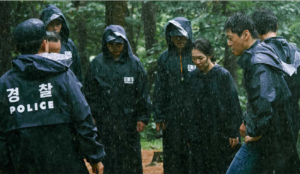
Horror and police procedural thriller are undoubtedly two genres that Korean film and TV handle extremely well. The Korean zombie resurgence shows a more recent side of this, while directors like Bong Joon-ho have explored the complex relationships between the police and crime in work such as Memories of Murder. The categories have also been combined to amazing effect, perhaps most chillingly in Na Hong-jin‘s The Wailing. Even the sensational Squid Game adds in an undercover cop to its deadly children’s game contest. Both genres require skilful use of tension, narrative tricks and dark subject matter, so it’s no wonder that they have often come hand in hand.
tvN’s new police thriller/chiller Hometown is Korea’s latest attempt to bring the two genres together. Set in the fictional city of Saju, the drama tells the story of a series of strange murders, the detective investigating them, and a family whose connection to a terrorist attack in the town a decade ago runs deeper than they might realise. By the show’s midway point, we have seen cults, ghosts, hypnotism, and explosions, presented through multiple timelines that sometimes confuse rather than clarify. Hometown tries hard to weave a complex, dark web, but so far it stops short of being completely successful.
This review contains spoilers.
From the very first moments of the show, we are shown a mise-en-scenè that is dreary, driving, and bleak. The town of Saju seems to have an unseasonable amount of rain and no sunshine, casting the cinematography in grey and blue tones throughout most of the episodes. We are in an unhappy world here, full of literal and figurative darkness. The show’s opening scene compounds this, as a young girl senses a terrifying presence in the bathroom, shortly after which her mother, on hearing her scream, winds up stabbed to death. There is absolutely no haste in establishing the horror elements of the show here, with plenty of tension, and mysterious lingering shots of doorways and long halls. At some moments this opening scene felt reminiscent of last year’s Netflix thriller The Call, another example of horror and thriller combining.
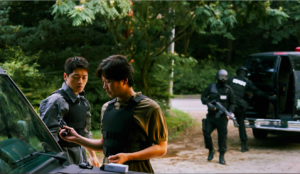
The police procedural element naturally sweeps in after this dramatic opening, with our central character, detective Choi Hyung-in (Yoo Jae-myung), working the case alongside newbie Lee Si-jung (Jo Bok-rae). Whilst the opening horror moments were inventive, this detective duo is straight out of the dark crime thriller handbook. One detective is senior, grizzled, a former alcoholic with a tragic past, and the other a fresh, naïve young man who is recently married. Whilst both actors carry these roles acceptably, these are such tropes of the genre that these investigative sections instantly lose their excitement.
Nonetheless, the narrative of the show takes pains to provide alternative entertainments. The main method it uses is split timelines. Whilst the show’s present day is set in 1999, there are frequent flashbacks into the mid-1980s, when a horrific sarin gas attack was committed on the eve of Chuseok at the local train station. We frequently jump back into this time period, more so throughout each episode. As well as the obvious function of revealing the backstory that this technique has, it also allows the audience to notice parallels between characters.
Our other central figure, the traumatised Jo Jung-hyun (Minari’s Han Ye-ri), has returned with her mother and niece to Saju in 1999; in 1987 it was her adopted brother who carried out the attack. Through the multiple timelines, we can see her past leading up to this event, uncovering mysterious goings-on with her colleagues in her school’s magazine club. The present neatly parallels this through her niece, Jo Jae-young (Lee Re) and her own friends, as they uncover the secrets of the past. These particular storylines work well in unveiling the show’s central mystery, as well as deepening our understanding of certain characters. Jung-hyun, especially, gets another dimension through seeing her past curiosity and where it has led her life.
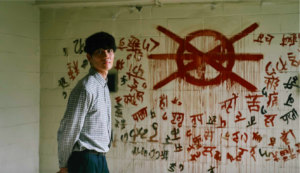
However, more often than not, these multiple timelines end up being confusing. Given that the cinematography doesn’t greatly change, and that the setting of the town is (I think, deliberately) generic, there is little to distinguish exactly which time period we are in, other than the title cards and age of specific characters. This may well be a deliberate choice by the writers to spin an opaque web, and at the midway point we can’t know where its threads will take us. However, this is only a partial excuse, as it puts the onus on the second half of the series to clarify everything that seems unclear so far. There are a lot of threads to tie up, and the show risks tripping up if it forgets one.
Whilst this is a crime thriller formally, the thematic core is far more on the horror side. Framed in part by our lead detective Hyung-in recounting the events of the investigation to police interviewers, our understanding of the story does largely come through his, and Jung-hyun’s, examining of the strange murders and disappearances. So far, so police procedural. However, the nature of these murders, which we get to see the preludes to, are supernatural in some way.
There are flashed glimpses of a Samara Morgan-style ghost woman, upside-down nightmares, and mix tapes playing mysterious chiming noises, all before an individual is driven to murder their partner and kill themselves. These specific scenes are the most captivating as they are the most well-built: there is great tension and a sense of real dread as we realise what is about to happen. They maintain an interest in what the hell is going on, while the investigations around them remain formulaic.
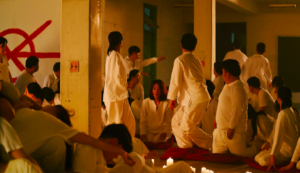
Luckily, as the episodes continue, there is more emphasis on the horror side of this drama. As well as being more compelling, it seems to provide the greatest moments of emotion for the characters, who, in some cases, are rather bland. For example, lead detective Hyung-in is played with such a stoic hardness by Yoo Jae-myung that the character actually reads as boring. Han Ye-ri’s performance is more engaging, if a slower burn, but both actors ramp their work up when dealing with the show’s central cult and its members.
Based around a mysterious symbol and a belief in an obscure figure referred to as “Guru” (who may or may not be the ghostly female figure plaguing murder victims), this cult is your classic blind faith, weird ceremonies, and writing-on-the-walls-in-blood type of gang. Their member Kim Hwan-kyu (Kim Shin-bi), a seemingly innocent young man, kidnaps and confesses to murdering Jung-hyun’s niece, which leads to a back-door interrogation by Hyung In that finally shows a depth to his character. Jung-hyun herself delves deeper into this cult in trying to find her niece, leading to her being kidnapped and lightly tortured/ questioned in a room filled with candles and symbols–the only decorations cults seem to accept.
The foggy purposes and sinister nature of this cult are nothing new, but the show’s move deeper into their world allows for the characterisations, that have thus far been rather muted, to really excite. There is a particular potency to the concept of the cult in Korea, with so many fringe Christian churches in the country morphing into them. In a scene in episode 6, there is a strong evocation of doomsday cults such as the Dami Mission (a Korean cult that believed the world would end on October 28th 1992, and prepared for mass suicide if it came to pass), with members conducting a bizarre ceremony dressed in white robes. How it connects to the characters, murders, and the terrorist attack remains to be seen, but there is perhaps the show’s best potential here to make an interesting comment on modern Korean society.
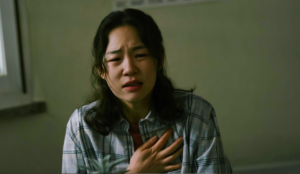
The development of this cult narrative is the most exciting part of Hometown, while the characters have yet to be given full space to grow. There are moments of brilliant work from the actors, particularly Han Ye-ri as she breaks down in tears after the detective tells her he does not want to help her family. But the most compelling performances actually come from the younger cast, unhampered by the writer’s decisions to make all of the adult characters either sullen, traumatised into introversion, or blank-faced. Their teenage bickering and plotting feels authentic in a world where other characters are busy philosophising on the nature of the strange murders. The chatter of the younger characters is what people would actually be saying in these situations.
Whilst Jyung-hyun’s brother Jo Kyung-ho (Um Tae-goo) gives calm yet lengthy monologues about why he committed the terror attack when interviewed in prison, these teenage girls moan about each other’s habits and make jokes. It brings a sense of realism to the story, as well as a touch of lightness. Not exactly comic characters, these teens still provide a refreshing change from a lot of heavy dialogue that can all blur into one.
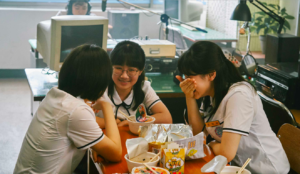
Ultimately, Hometown is a valiant effort to marry together the potential of the crime thriller and horror genres. Though it currently confuses due to its multiple plotlines and timeframes, there is hope that these will resolve neatly if the writing develops in a streamlined way. As the cult plot point comes to the fore, we can only hope that the rest of the world of Saju is drawn towards it like a magnet, and that everything subsequently becomes clearer.
Now that characters are established, there is room to add to their layers, a facet missing from some of our main cast. Hometown could become a thrilling, frightening exploration of the impact of cults and their evil underpinnings if it plays its cards right. All it needs is a momentum it has thus far been lacking, that we can hopefully see as its labyrinthine story unfolds further.
(Images via tvN.)


